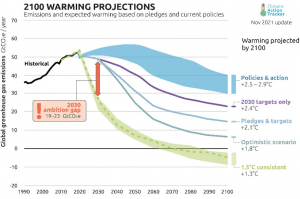By Clare Woo | ACICIS intern at Environmental Institute
A shocking study published last year in The Lancet showed that 75% of the young participants said that “the future was frightening”1. Commonly described as “climate anxiety” or “eco-anxiety” it is becoming a concerning global phenomenon where people experience feelings of grief, rage, helplessness, hopelessness, and sorrow when they understand the full extent of our ongoing climate and ecological crisis2.
A survey by Iris showed almost all Indonesians (95%) are concerned about climate change, with more than half very worried about the issue, which is considerably higher than the global average3. Indonesians were especially concerned with the direct effect on humans and how climate change will impact future generations3.

(ClimateSceince, 2022)
These worries are not baseless as the recent 2022 IPCC Sixth Assessment Report paints a grim picture of our near future. They describe that a near-impossible immediate suspension of emissions is needed to prevent 2 degrees of warming and environmental disaster4. It warns that the world is close to reaching some major tipping points, beyond which, the permanent damage cannot be repaired. Slowly, our small increases in emissions have built up significantly over time to where we reach tipping points- beyond which will trigger a systems shift that cannot be reversed by undoing those initial small changes5.
Past this tipping point, we enter the point of no return and into a new era of the earths systems. We are already seeing rises in temperature over such a short space of time that have not occurred for more than 3 million years. Some of these tipping points involve:
-

(Climate action tracker, 2021)
Melting of ice sheets: once a certain amount of ice mass has melted, a runaway positive-feedback loops starts. Higher water temperatures melt the ice, decreasing ice surface area, leaving more ocean exposed to absorb the suns heat which leads to increased temperatures and the cycle continues. This would lead to sea level rise of several metres in the next hundreds to thousands of years5.
- Deforestation: a significant loss of vegetation and biodiversity can ruin the water cycle and removes a valuable carbon sink. This can completely decimate a landscape, leading to fires, regional droughts and flooding as well as the breakdown of crucial ecosystem services5.
- Disrupted climate systems: weather patterns are largely driven by ocean currents, however as ocean waters become warmer, the artic and tropical deep sea temperature differences become less polar causing sea currents to slow. This can cause a breakdown in our climate systems, causing more extreme temperatures and weather events, leaving less of the Earth’s surface habitable6.
Other studies which involve a moderate mitigation strategy and have a 1.5 warming threshold, suggest the Point of No Return has already passed. Even models with the most aggressive mitigation strategies foresee that we only have until 2027 to prevent the oncoming climate crisis7.
With this dooms-day information, it is no wonder that the youth of the world are feeling so scared towards their future. Indonesia’s high levels of climate anxiety may have to do with Indonesia’s unique position as an island nation who are extremely vulnerable to the effects of climate change. Anxiety levels may also be so high because many people are already being severely impacted. President Joko Widodo has already announced moving the counties capital from Jakarta to Borneo in order to escape the already rising sea levels8.
On a local scale, a recent interview described how communities can visually see “more rubbish than colourful fish underwater” and on a daily basis observe how “the sky is grey today, not blue”. Many of those living in the city felt “dread” about the state of the environment back in their hometown and that “it had lost the beauty it had before”9.
Fuelled by this anxiety, many have decided to take action by changing their lifestyle habits, trying their hardest to be sustainable and involving themselves in protests to create change9. There is a lot of pressure and responsibility placed on the public as we often hear that population pressures and our overconsumption are responsible for the worlds current state. This can create “climate-guilt” where people feel excessive guilt and shame for any action that has a negative impact on the environment10.
The Indonesian youth simply “just want to create a liveable future for the next generation” and believe that since “we all live on Earth, and we have to take responsibility for our environment”9. Whilst a great attitude to take, the constant burden of climate anxiety and guilt with no indication of the environment improving leaves many of them to “wonder if they should continue what they are doing or just give up”9.
Indonesia is a newly industrialized country that is still growing its economic and financial resources. The country ranks in 123rd place for its per capita emissions, yet will be disproportionately affected by the immediate impacts of climate change compared to the richest and most polluting countries of the world11.
Similarly, a Report revealed that just 100 companies have been the source of more than 70% of the world’s greenhouse gas emissions (1 trillion tonnes) since 198812. These companies have been making immense profits off environmental degradation whilst also disregarding the immediate and long term impacts this damage will have on the rest of the world.

(World Inequality Report, 2021)
Comparably, a recent study by Yard has exposed various celebrities’ outrageous usage of private jets and their carbon emissions. We often admire the dazzling lives of the rich and famous, however they are significant contributors to global emissions.
The world-famous singer-songwriter Taylor Swift was the biggest offender this past year, emitting 8,293.54 tonnes from her private jet travels, even though she is not currently touring13.
To put this into perspective: Taylor Swift’s private jet alone emits roughly 4,100 times more than the average Indonesian emits annually13. That means the average Indonesian would have to live for more than four thousand years in order to emit what Taylor creates from her jet in just one year.
There is a vast divide between the super-rich and the rest of the world which is frustrating when we try to live more sustainable lives whilst others take a 6-minute private jet trip to avoid traffic13.
The truth is that there is a limit to how much one person can change, and we need radical solutions and policies in order to change the current systems in place and hold those who are truly responsible for the damage to our environment. Whilst personal concern and accountability towards climate change is necessary to protect the environment, the most affluent countries, polluting companies and profligate individuals should pull more of their weight when it comes to reducing greenhouse gas emissions.
Reference
- Hickman, C., Marks, E., Pihkala, P., Clayton, S., Lewandowski, E., Mayall, E., Wray, B., Mellor, C. and van Susteren, L., 2021. Young People’s Voices on Climate Anxiety, Government Betrayal and Moral Injury: A Global Phenomenon. SSRN Electronic Journal, [online] Available at: <https://papers.ssrn.com/sol3/papers.cfm?abstract_id=3918955#> [Accessed 28 July 2022].
- Clayton, S., 2020. Climate anxiety: Psychological responses to climate change. Journal of Anxiety Disorders, [online] 74, p.102263. Available at: <https://www.sciencedirect.com/science/article/pii/S0887618520300773> [Accessed 1 August 2022].
- Herdman, D., 2021. Climate Change Survey Indonesia Shows High Concern. [online] Illuminate Asia. Available at: <https://www.illuminateasia.com/blog/articles/detail/iris-global-climate-change-survey-2021-indonesians-show-high-concern-over-the-issue-of-climate-change-yet-are-overly-optimistic-to-how-to-overcome-and-reverse-the-impacts> [Accessed 1 August 2022].
- Collins, P., 2022. IPCC climate report 2022 summary: The key findings. [online] Climate Consulting. Available at: <https://climate.selectra.com/en/news/ipcc-report-2022#:~:text=The%20IPCC%20report%202022%20warned,help%20prevent%20an%20environmental%20disaster.> [Accessed 1 August 2022].
- ClimateScience. 2022. Tipping Points: Why we might not be able to reverse climate change. [online] Available at: <https://climatescience.org/advanced-climate-climate-tipping-points> [Accessed 1 August 2022].
- NOAA Ocean Exploration. 2022. How does the ocean affect climate and weather on land? : Ocean Exploration Facts: NOAA Ocean Exploration. [online] Available at: <https://oceanexplorer.noaa.gov/facts/climate.html> [Accessed 1 August 2022].
- Sorab, V., 2019. Too Little, Too Late? Carbon Emissions and the Point of No Return. [online] Yale Environment Review. Available at: <https://environment-review.yale.edu/too-little-too-late-carbon-emissions-and-point-no-return> [Accessed 28 July 2022].
- ENGLAND, K., 2020. Deep Dive: Rising Sea Levels Force Relocation of Indonesian Capital. [online] Earth.Org. Available at: <https://earth.org/deep-dive-rising-sea-levels-force-relocation-of-indonesian-capital/> [Accessed 1 August 2022].
- Papadopoulos, M. and Renaldi, E., 2021. When this diver saw more rubbish than fish in the ocean, she took action. [online] ABC News. Available at: <https://www.abc.net.au/news/2021-10-17/young-people-experienced-eco-anxiety-while-trying-to-save-future/100539788> [Accessed 28 July 2022].
- BBMG, 2021. Climate Change Guilt and Next Gen Action. [online] B the change. Available at: <https://bthechange.com/climate-change-guilt-and-next-gen-action-fe68b411ac51> [Accessed 1 August 2022].
- Worldometers. 2016. CO2 Emissions per Capita. [online] Available at: <https://www.worldometers.info/co2-emissions/co2-emissions-per-capita/> [Accessed 1 August 2022].
- Griffin, D., 2017. CDP Carbon Majors Report 2017. [ebook] London: Climate Accountability Institute. Available at: <https://cdn.cdp.net/cdp-production/cms/reports/documents/000/002/327/original/Carbon-Majors-Report-2017.pdf?1501833772> [Accessed 1 August 2022].
- Yard. 2022. Just Plane Wrong: Celebs with the Worst Private Jet Co2 Emissions. [online] Available at: <https://weareyard.com/insights/worst-celebrity-private-jet-co2-emission-offenders> [Accessed 1 August 2022].




